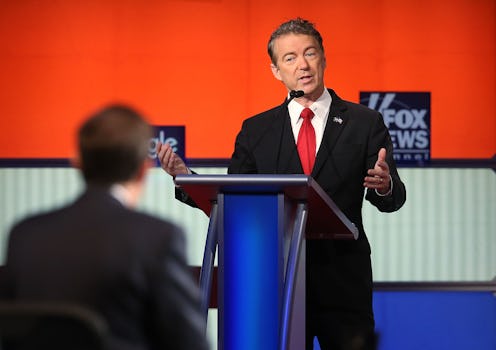News
Rand Paul Answers The Big Abortion Question
It came as a surprise Thursday night when Rand Paul addressed abortion and challenged Roe v. Wade, which sparked some serious feelings among more openly religious members of the Republican presidential candidacy field. The dialogue began when Chris Wallace piqued Paul by addressing an earlier distinction he had made on the campaign trail between the importance of fighting the national debt and tackling something like abortion. Wallace then asked Paul if a blue state wished to make abortion legal (which it is, as a fundamental Constitutional right, according to 1973 landmark decision Roe v. Wade), how he would respond to dissenting conservative voters who believe it is akin to murder.
Paul seemed to evade the question, dancing around it a bit with responses like:
You know, I think abortion is always wrong. I've supported a variety of solutions, both state as well as federal. In fact, just last week, I introduced the Life at Conception Act, which would say that the 14th Amendment would defend an individual even in the womb.
This is a most unusual response, particularly because it comes from a self-proclaimed libertarian. As libertarians staunchly support the tenet of free will, calling abortion wrong is contradictory — unless, of course, Paul believes in moral relativism, which he did not confirm. He continued:
But I think on the broader question of religion and politics, you know, I think liberty, itself requires a virtue -- requires a virtuous people. In fact, Washington said that democracy requires a virtuous people.
Paul then followed up with some remarks about theology, citing virtue and self-restraint as the only restraint consistent with liberty — which would seem to challenge any possibility of a belief in relativism — and explaining the need for a religious bearing as a nation. He stated:
The government is not always going to save us and it's not always going to come from government. But if we don't know right and wrong, I think we have lost our way. I think we become unmoored and I think without the religious foundation that guides us all, I think we have a great risk of going horribly in the wrong direction.
At that point, Wallace simply came out and asked his question more directly:
Do you favor the idea that abortion should be a states' rights issue and if a liberal state wants to make it legal, that that's their choice? Yes or no?
Paul then gave a most curious reply, comprising the need for both a state and a federal approach:
I have said that we could leave it to the states but I've also introduced a federal solution as well. So the federal solution would be the Life at Conception Act, which is an act that would federalize the issue. But I've also said for the most part, these issues would be left back to the states. So there might be an occasion if we did overturn Roe v. Wade — Roe v. Wade nationalized the issue. If you had the court reverse Roe v. Wade, it would become a state issue once again.
One might ask whether a debate in 2016 is really the optimum time for an otherwise libertarian candidate — and supposedly the only libertarian on either presidential candidacy stage — to challenge a 1973 landmark decision that gives women autonomy over their bodies. According to Paul, it is necessary to save and preserve lives:
I think it would be better the more— the less abortions we have, so the more states that we have that made abortion illegal, the better, as far as trying to save and preserve lives.
Only the approaching caucuses and primaries will reveal how Paul fared on that response.
